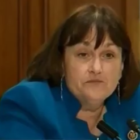This is a special election edition of Garry Rayno’s Distant Dome, which is co-published by InDepthNH.org and Manchester Ink Link
By GARRY RAYNO, Distant Dome
The Blue Wave was not a tsunami nationwide, but it certainly was in New Hampshire, where Democrats took control of the House, Senate and Executive Council for the first time since 2011.

Evan Lips photo
Gov. Sununu
Like former Gov. John Lynch, a Democrat, survived a Republican takeover after the 2010 election, current Republican Gov. Chris Sununu survived the Blue wave. He defeated former Sen. Molly Kelly, but the next two years in office are going to be very different from his first two years when his fellow Republicans controlled the House, Senate and Executive Council.
The 2018 midterm election set a New Hampshire record for a non-presidential year as more than 560,000 voters cast their ballots Tuesday, far greater than in years past.

Garry Rayno
Nationally, Democrats won control of the House, while Republicans added to their majority in the Senate, which approves judges and department heads giving President Trump continued leverage over the judiciary and the executive branch.
However, the US House will be able to block the GOP agenda that sailed through Congress the last two years such as tax cuts for corporations and the wealthy, eliminating regulations and increased military spending, even if funding for a wall never materialized, although it may in the lame-duck session.
Republicans even in control could not repeal the Affordable Care Act, but Trump has managed to peel away key components such as the insurance mandate which makes the program much more unstable.
New Hampshire did its part in helping Dems take control of the Senate by keeping both Congressional seats Blue.
In the 1st District, executive councilor and Manchester businessman Chris Pappas defeated former liquor commission enforcement chief Eddie Edwards in what looked like a close race at the beginning of the night, only to see Pappas pull away as large towns around Manchester including reliably GOP Bedford and Goffstown going to Pappas.

U.S. Rep. Annie Kuster, D-NH
In the 2nd Congressional District, three-term US Rep. Annie McLane Kuster easily won re-election to a fourth term in the Democratic-leaning district as she won big in Concord, Nashua, Keene and the Upper Valley.
Sununu had widespread support, but Kelly did well enough to ensure Democratic candidates remained alive further down the ballot. In Kelly’s case, this wasn’t the year of the woman in New Hampshire as some of the Democratic hierarchy envisioned.
NH Senate
However, it looked more like a woman’s year in the state Senate, when two women knocked off veteran Republicans in districts in the southern tier.
Rep. Shannon Chandley, D-Amherst, beat Senate Finance Chairman Gary Daniels, R-Milford, for the District 11 seat, which is heavily weighted towards Republicans as is District 12, where former Rep. Melanie Levesque, D-Brookline, defeated four-term Sen. Kevin Avard, R-Nashua.
Two districts significantly redrawn to favor Republicans in the Seacoast, 23 ad 24, also saw Democrats win flipping two seats.

State Sen. Dan Innis was defeated
Former Rep. Tom Sherman, D-Rye, defeated first-term Sen. Dan Innis, R-New Castle, and Jon Morgan, D-Brentwood, defeated first-term, Sen. Bill Gannon, R-Sandown.
Another unlikely Democratic victory in a Republican leaning districts saw Jeanne Dietsch, D-Peterborough, defeat former Rep. Dan Hynes, R-Bedford, in the open District 9 seat vacated by Andy Sanborn, who ran unsuccessfully for the GOP nomination in the 1st Congressional District.
Democratic senators who won re-election were Lou D’Allesandro, Donna Soucy and Kevin Cavanaugh of Manchester, Dan Feltes of Concord, Martha Fuller Clark of Portsmouth, Martha Hennessey of Hanover and Jay Kahn of Keene.

Sen. Jeff Woodburn was defeated
Rep. Cindy Rosenwald, D-Nashua, won the open District 13 seat, while former Senate Minority Leader, Jeff Woodburn of Dalton, lost his race amid allegations of domestic abuse.
Senate President Chuck Morse of Salem and Majority Leader Jeb Bradley of Wolfeboro easily won their races, but they will be in the minority after organization day Dec. 5.
NH House
Not only did Democrats flip the House soundly winning about 230 of the 400 seats, but some long-time lawmakers were defeated from both parties, the most prominent being House Speaker Gene Chandler of Bartlett.
Other long-time Republicans losing Tuesday include Bill Ohm, Karen Umberger, Frank Sapareto, Mark McConkey, Bonnie Ham, Bart Fromuth and Victoria Sullivan. About 35 Republican incumbents lost their seats.
Democrats Sue Gottling and Virginia Irwin lost. Herb Richardson of Lancaster is a long-time state representative but until very recently he was a Republican. He just turned Democrat, which may have been a factor in his defeat along with his support of the Northern Pass Transmission project.
Executive Council
Much like the state Senate, which was gerrymandered to make it impossible for Democrats to take control, so was the Executive Council with three districts heavily favoring Republicans, one a Democratic lock and another that leans ever so slightly GOP, which is District 1.
In District 1, Michael Cryans, D-Hanover, finally defeated incumbent Joe Kenney R-Wakefield, for the seat long held by the late Ray Burton.
The two candidates have faced off in every election since Burton died in office, and Kenney won every contest until Tuesday.
Andru Volinsky, D-Concord, had no trouble winning re-election in the Democratic stronghold of District 2.
While District 5 certainly favors Republicans, Democrat Debora Pignatelli and Republican David Wheeler have faced off more times than Cryans and Kenney.

Debora Pignatelli won
On Tuesday, Pignatteli, who stepped down four years ago due to health issues, defeated Wheeler by a comfortable margin.
Russell Prescott in District 3 barely held on to his seat, while former Manchester Mayor Ted Gatsas, pulled out a very close contest with former Dyn executive Gary Chynoweth.
These races, like many in the Senate, a couple yet to be decided, were extremely close with Democrats showing greater strength than in the past few elections.
The large Democratic turnout for the primary election and the party’s near run of the table for special elections the last two years were harbingers of Tuesday’s showing.
Republicans can take solace with Sununu’s victory, but their agenda of right-to-work, continued business tax cuts, school vouchers, loosening gun laws, and limiting abortion rights will be off the table for the next two years.
Like Lynch after the 2010 election, Sununu will have to learn to work with Democrats on what he can, or next to nothing will be done in Concord for the next two years.
If the election was as Trump said he wanted — a referendum on him — the New Hampshire results indicate he is not a popular man in the Granite State.
Garry Rayno may be reached at garry.rayno@yahoo.com
Distant Dome by veteran journalist Garry Rayno explores a broader perspective on the State House and state happenings. Over his three-decade career, Rayno covered the NH State House for the New Hampshire Union Leader and Foster’s Daily Democrat. During his career, his coverage spanned the news spectrum, from local planning, school and select boards, to national issues such as electric industry deregulation and Presidential primaries. Rayno lives with his wife Carolyn in New London.





